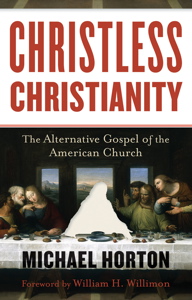 Today and tomorrow we will be sharing a recent interview that Passion for Preaching (P4P) held with Michael Horton, author of Christless Christianity, which we reviewed here recently. Dr. Horton has some wonderful insights into the world of popular American Evangelicalism.
Today and tomorrow we will be sharing a recent interview that Passion for Preaching (P4P) held with Michael Horton, author of Christless Christianity, which we reviewed here recently. Dr. Horton has some wonderful insights into the world of popular American Evangelicalism.
1. What prompted you to write Christless Christianity?
Michael Horton (MH): Lots of conversations with believers—pastors and parishioners—across a wide spectrum over many years, as well as my own growing sense that it’s tough to find churches where Christ is clearly proclaimed in his saving office, from Genesis to Revelation. This provoked me to investigate the state of things by reading popular sermons and books on ministry, as well as sociological analyses. Unfortunately, this research confirmed my suspicions about a creeping fog across the ecclesiastical spectrum, which I nickname “Christless Christianity.”
2. Near the beginning of your book you write, while the blood of the martyrs is the seed of the church, the assimilation of the church to the world silences the witnesses (p. 16). How do you suggest the church contextualize the communication of the gospel without compromising the message of the gospel?
MH: I think that we often assume a pretty naïve view of the cultural contexts that shape us. That’s understandable. After all, it’s hard to see the ways in which we are being mis-shaped and thrown off course by assumptions and practices that are so deeply embedded in our own lives. I think we need less talk about contextualizing the gospel and more talk about the clash between the gospel and what we think “the real world” happens to be. Our context, after all, increasingly makes Christian faith and practice unintelligible. People may go on repeating orthodox slogans, formulas, and phrases, but our daily lives are often shaped by narcissism, consumerism, pragmatism, and a therapeutic orientation that has us asking the wrong questions.
3. How does the message of this book apply equally to orthodox Christians who may have different denominational background than you? For instance, how can Baptist or Methodist believers connect with your message that is very Presbyterian in nature?
MH: A Methodist bishop wrote the foreword! I won’t deny that I come from a particular perspective: I’m a Reformed minister. However, my reflections are shaped by interaction with believers from a wide spectrum. I’ve been amazed by the response to the book: agreement from Lutherans, Baptists, Episcopalians, Methodists, and independents. The problem cuts across denominations, even across the deeper divides not only between Roman Catholics and Protestants and Arminians and Calvinists but even between conservatives and liberals. We’re all struggling with this. Christ-centered faith and witness is, of course, an ecumenical concern, so I’m glad that so many brothers and sisters outside of my own tradition see the same problems and encourage some of the same solutions.
4. You are careful to point out that an emphasis on personalized religion has in large part removed the objective message of the gospel and transformed the gospel into a subjective reality. How would you reconcile the evangelical emphasis of personal conversion with the reformed emphasis on faith within the covenant community? Is faith necessarily an either personal or communal reality, or is best understood as a both and?
MH: Both/and. Individualism is a big problem, especially in our culture, where narcissism has practically become a virtue—in subtle and not-so-subtle forms, even in the church. When the supreme demographic of being “in Christ” is no longer the focus, churches coalesce around niche demographics: defined by race, generation, socio-economic and political affinities, and cultural tastes. But deeper even than the problem of individualism versus a more communal/covenantal approach to things is the way in which we have turned the objective gospel—an announcement about what God has done in Christ to save the ungodly—into a subjective message about our transformation, our experience, our piety, our zeal, and our service. It’s our version of the perennial debate between Pelagian works-righteousness and the gospel of salvation by grace alone, in Christ alone, through faith alone. When the church loses its confidence in the power of the gospel to create the new world of which it speaks, we turn to other sources of power that we find more culturally “contextual.”

1 thought on “Interview With Michael Horton Pt. 1”
Comments are closed.